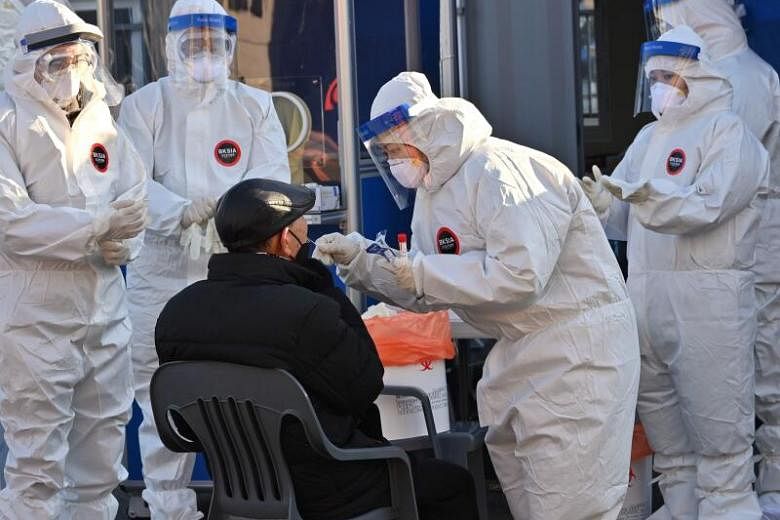SEOUL (THE KOREA HERALD/ASIA NEWS NETWORK) - President Moon Jae-in told the people on Dec 9 to "have faith in the ability of the government to stamp out the pandemic".
He said that "the end of a long tunnel can be seen at last". It was wishful thinking that vaccines and medicines could eradicate the coronavirus soon.
The following day, Health and Welfare Minister Park Neung-hoo said the opposite - that "the nation faces a precarious situation where the government's ability to control the disease will reach the limit in the near future".
On Dec 11, a senior ministry official asked people to "refrain from social activities as much as possible".
On Saturday (Dec 12), South Korea reported a record 950 coronavirus cases, its largest daily increase since the nation's first case was confirmed Jan 20.
Then Mr Moon said in an urgent message that the nation was in a state of emergency and vowed to take extraordinary measures.
He said he was sorry for failing to stabilise the coronavirus situation early. The daily count of new Covid-19 cases had risen to 1,030 as of midnight Sunday (Dec 13).
Cheong Wa Dae saw no further than its nose. It is questionable if it is really communicating with the health authorities.
Mr Moon said the government will increase testing sharply from next week.
With the resurgence of infections, sickbeds for critically ill patients in Seoul and Gyeonggi Province, which surrounds the capital, might run out any minute.
According to the Central Disaster and Safety Countermeasure Headquarters on Saturday (Dec 12), just 58 sickbeds were immediately available nationwide for serious Covid-19 patients as of Friday.
They included 11 beds in the Greater Seoul area - seven in Seoul, three in Gyeonggi Province and one in Incheon.
A yearlong struggle with the pandemic has stretched medical resources. Doctors, nurses and other personnel are weary. The military and police will be mobilised to help with contact-tracing efforts.
Health authorities on Thursday (Dec 10) scrambled to build temporary sickbeds in shipping containers outside the Seoul Medical Centre in Seoul. The makeshift beds are below the level of regular hospital beds.
Given the rapid spread of the virus, some patients may be assigned to beds in the containers.
It is pitiful that South Korea had to install container beds, though nearly a year has passed since the nation reported its first Covid-19 patient. In this situation, the government says it will increase coronavirus tests sharply.
In February, when infections spiked in Daegu, medical professionals argued several times that the government should prepare for the possibility of the disease surging in the populous Seoul area.
Seeing the authorities install containers on a vacant lot of a hospital, one cannot but ask them what they have done so far. Britain was the first Western country to start coronavirus vaccinations of its people last week.
Other European Union members are expected to follow suit soon, as are the United States and Japan.
However, it is unclear when Koreans will be vaccinated.
The government said it has arranged to buy 64 million doses of vaccines from four pharmaceutical companies - AstraZeneca, Pfizer, Johnson & Johnson's Janssen and Moderna.
It has pre-purchased 20 million doses from AstraZeneca, which covers 10 million people.
But US clinical trials of AstraZeneca's shot were reportedly stopped earlier this year after a trial subject in Britain fell ill. That has set back the timeline for the US trial. Emergency use authorisation is reportedly coming toward the end of February or early March.
It is uncertain whether the government will be able to vaccinate people in the first quarter of next year.
Minister Park said the government would not hurry inoculation to allow for more time to observe potential side effects.
If not for the latest surge of infections, or if it had been contained early, his words might be understandable. But the current situation does not look so relaxed.
The recent spike is strong, sickbeds for serious patients are running low and front-line medical workers feel fatigued.
The proportion of infections from asymptomatic silent spreaders topped 20 per cent. Prime Minister Chung Sye-kyun said Saturday that Korea faces the biggest pandemic crisis since the outbreak of the coronavirus in the country.
Major countries may be getting out of the tunnel as early as next spring, while South Korea may stay inside it. South Korea was praised for its rapid contact-tracing and testing, but the applause has long since died down.
The Korea Herald is a member of The Straits Times media partner Asia News Network, an alliance of 24 news media organisations.

